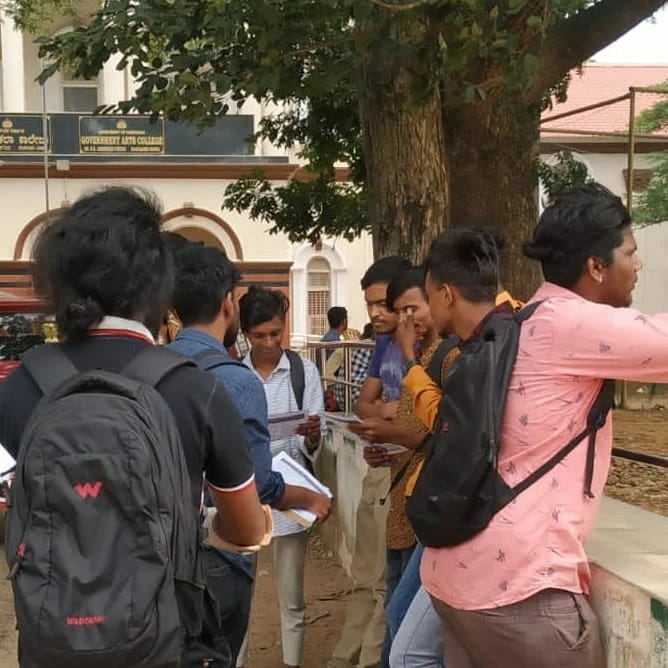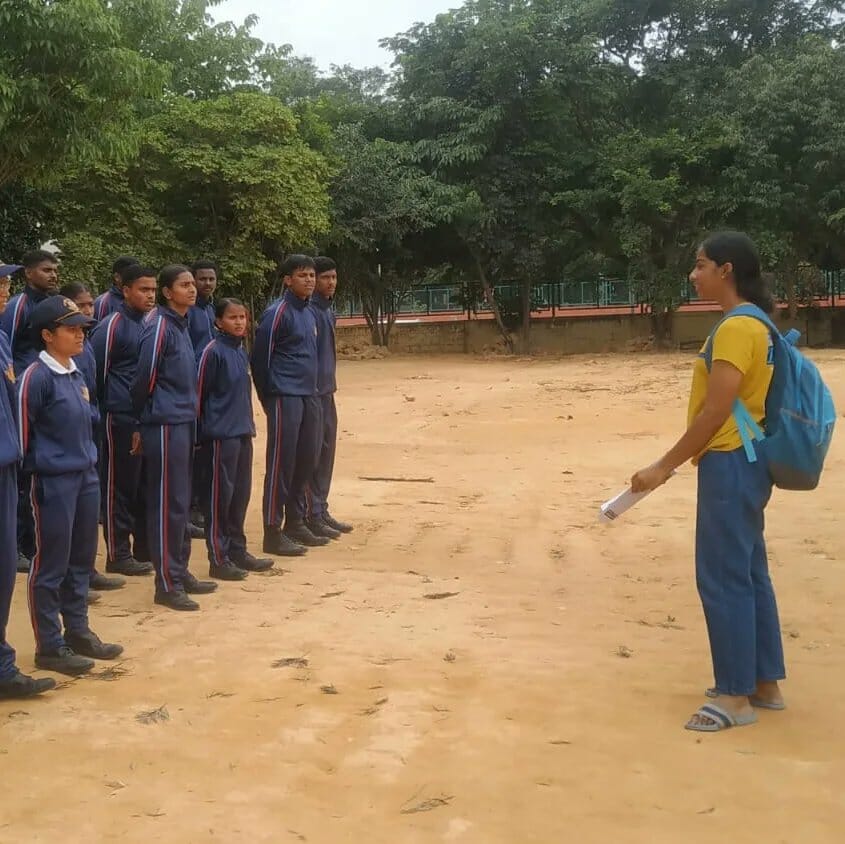In February this year, a video of a skit performed by students of Jain University went viral. Seven students performed what they called a “satirical drama skit which revolves around the reservation system prevailing in society.” Anti-caste activists pointed out the casteism in the skit that appeared to mock Dr BR Ambedkar, Dalits, and reservation. The outrage led to FIRs against the students and faculty of Jain University under the SC/ST (Prevention) Atrocities Act.

Campaign for SC/ST cells
While the criminal case and disciplinary action continues, young people in Bengaluru want more systemic changes to prevent such incidents and make the city’s colleges safe for SC/ST students. COLLECTIVE Bangalore, a leftist youth organisation that started in 2015 in Jawaharlal Nehru University (JNU) and in 2021 in Bengaluru, is now campaigning for proactive SC/ST cells in Bengaluru’s colleges.
“The institutional murders of SC/ST students in the past few years, including Rohit Vemula, Payal Tadvi and most recently Darshan Solanki in IIT Bombay made us feel that there needs to be more proactive preventative action in our educational institutions”, says Shalom, a member of COLLECTIVE Bangalore.
When the Jain College skit controversy happened, the Collective campaigned for action against the students. When they spoke to students they felt there was a lack of awareness around caste discrimination on campuses, as well as the fact that their colleges should have an SC/ST cell.
This led to the youth group’s campaign for proactive SC/ST cells. “Campaigns after such institutional murders are focused on taking action against perpetrators or the university, not on prevention. We felt that it is important to demand mechanisms within the campus as a preventive measure, rather than wait for another institutional murder of a student.”
The Collective began a signature campaign around the city’s colleges. While the group did not have permission to enter colleges, they spoke to students of six colleges: UVCE, Govt Arts College, City College, RC College, Acharya College and Maharani College. They also wrote to Jagdeesha G, the Collegiate Commissioner of the State. Incidentally, the Collegiate Commissioner was reprimanded by the Ministry of Higher Education for failing to submit a report on the Jain University skit, despite three reminders. We were unable to reach the Collegiate Commissioner for comments for this story. We will update this article if he responds.
UGC guidelines confusing
However, the UGC guidelines around SC/ST cells have changed multiple times in just 2023. SC/ST cells have been mandatory in all colleges, universities and deemed-to-be universities in the country since the nineties.
In 2002, as part of its Tenth Five-year Plan, UGC decided to provide financial assistance for higher education institutions that come under Section 2(f) and 12 (b) of the UGC Act to manage these SC/ST cells. Institutions that meet the conditions listed in these sections are eligible to financial assistance from the UGC for various activities.
SC/ST cells of these institutions were meant to ensure that reservation is implemented where applicable and to document the number of SC/ST students as well as faculty in the campus. They were also meant to provide students with information on scholarships and government schemes, and act as grievance cells for discrimination or harassment complaints.
The cells were supposed to be headed by senior faculty members and have a designated office space in colleges and universities and receive financial assistance of Rs 50,000 per annum from UGC.
In 2012, UGC initiated the Promotion of Equity in Higher Educational Institutes Regulations. Under these regulations, colleges must form equal opportunity cells or caste-based discrimination cells in colleges.
In April 2023, UGC changed the rules again. Under its new rules for Redressal of Grievances of Students, 2023, the body removed mandates for a separate SC/ST cell. Higher education institutions would have to set up a Students’ Grievance Redressal Committee (SGRC) headed by a person of the rank of professor.
The committee would have four faculty members and a student representative. UGC also mandated that these cells must have at least one SC, ST and a woman member. The new rules were criticised for diluting policies that specifically protected SC/ST students, instead of strengthening their implementation.
“It’s absolutely ridiculous and definitely requires strong opposition from students. The 2012 guidelines were not perfect, but at least acknowledged the problem at hand. This is an attempt to trivialise caste and equate it to other grievances in a manner that does not take cognizance of structural discrimination,” says Shalom.
In August this year, UGC announced the formation of an expert panel to revisit regulations and schemes for SC/ST students in higher education.
Bengaluru students unaware
In Bengaluru, students appear to have little to no understanding of caste or the regulations. COLLECTIVE members found, during informal conversations with around 100 students, that most had no idea if their college had SC/ST cells or that it was mandatory. Shalom contrasts this with the initiative taken by colleges against ragging.
“Most Karnataka colleges have taken the anti-ragging policy very seriously. Students are informed of the policy during orientation. They are made to sign forms pledging they will not indulge in ragging. But the same effort is not made for SC/ST cells,” she says.
Students from private and autonomous colleges like Mount Carmel, with whom the COLLECTIVE interacted, felt there was no caste in their campuses. “But most were not even aware of the Jain College skit that was performed in the Mount Carmel campus,” points out Shalom.
In contrast, students from government colleges like Maharani’s College for Women and Government Arts College, were more aware of caste dynamics since many of them were from SC backgrounds. But even these did not know much about SC/ST cells in their colleges, notes Shalom.
Read more: Caste pervades every aspect of life in Bengaluru: Panel discussion
SC/ST cells in Bengaluru Colleges
Our own cursory search showed that several colleges in the city, both government and private, did not provide adequate and clear information on Caste Discrimination Cells on their websites. Some like Jain deemed-to-be University did not list the presence of an SC/ST Cell, Equal Opportunity Cell or Student Grievance Redressal Committee on their website. We looked at multiple Schools listed on the Jain University website.
Others like St Joseph’s College (Autonomous) mentions a body to prevent caste-based discrimination but does not list any committee members. The online form on the St Joseph’s website for complaints does not work.
Even some government colleges, such as Maharani`s Arts, Commerce and Management College for Women do not provide any information online. Of course, online information may not be updated. However, officials from these colleges were unreachable for comments. We will update this story if we get a response.
The mere presence of a SC/ST cell does not mean much says Shalom. “Several colleges have cells but they are not functional.” The COLLECTIVE is looking into expanding the campaign across the city and involving more students. “Right now we’re focusing on getting more students involved since ultimately the initiative has to come from within the colleges rather than from outside,” adds Shalom.
Challenges for colleges
Several others do list SC/ST cells complete with information of members on their website. Rakesh Katarey, Professor and Chairperson of the Prevention of Caste Based Discrimination (SC/ST/OBC) committee at Dayanand Sagar University, says that the committee takes its work seriously.
“We work on the basis on complaints. A complaint can be given directly to the chairperson or the members of the anti-discrimination cell whose contacts are displayed prominently at all constituent colleges. Any person can send a mail directly to any of the members. The committee sits immediately, investigates the matter and calls all the persons involved in an incident. Following this, the committee sends a report to the Registrar for further action.”
Rakesh accepts that caste discrimination cells do not end by themselves cannot end discrimination. “We have NCRB data that says that an average of 50,000 cases of crimes against Dalits are being reported every year. Knowingly or otherwise, we have been socialised into accepting and repeating discrimination”.
However, he believes that the presence of a mechanism can be a major deterrent. “If people know that there is a cell that deals with issues of discrimination, the message that it is unacceptable is also being sent to everyone.”
The existence of the Caste Discrimination Cell in DSU is advertised all over the campus. “Students and even faculty can see it as soon as they enter and punch in for the day. I think that serves as a good reminder that such a mechanism exists,” says Rakesh.

In BMS Institute of Technology and Management, the current SC/ST cell has been operational since 2016. Chairperson and Assistant Professor Lakshmisagar HS, says that BMS-IT has over 400 SC/ST students.
According to Lakshmisagar, the cell has focused on providing information on scholarship schemes, placement and encouraging students to participate in cultural activities. “We do conduct programmes explaining their rights and the law around caste-based discrimination,” says Lakshmisagar.
Detailed record keeping has helped the institution track the progress of SC/ST students, claims Lakshmisagar. “Now, over 90 percent of our SC/ST students get placement after graduation,” he says. However, the professor notes a crucial lapse in support from UGC. Since 2008, the institute has not received any financial support from UGC despite the BMS-IT being an eligible institution for support under the tenth and twelfth five year plan.